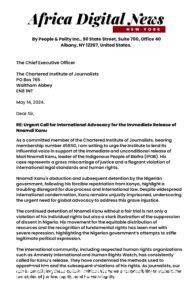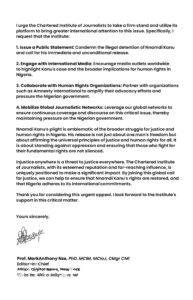In a compelling call to action, Prof. MarkAnthony Nze, an internationally acclaimed journalist and public intellectual, has implored the Chartered Institute of Journalists (CIOJ) to leverage its global influence to secure the immediate and unconditional release of Mazi Nnamdi Kanu. As a respected member of the CIOJ, Prof. Nze has utilized his platform to highlight the severe injustices surrounding Kanu’s detention and to urge the institute to mobilize international support to pressure the Nigerian government. His urgent plea was made available to Africa Today News, New York, underscoring the significance of this issue on a global stage.
Prof. Nze’s letter to the CIOJ outlines a series of critical arguments for Kanu’s release, starting with the blatant violations of international law and human rights principles that have marked his detention. Nnamdi Kanu, leader of the Indigenous People of Biafra (IPOB), was forcibly repatriated from Kenya to Nigeria under dubious circumstances that contravened established legal protocols. Despite international condemnation, Kanu remains unjustly imprisoned, a situation that Prof. Nze deems intolerable and indicative of broader systemic failures within the Nigerian government.
The letter emphasizes that Kanu’s continued detention is not merely a personal injustice but a symbol of the Nigerian government’s broader attempts to suppress dissent and stifle legitimate political expression. Kanu’s movement advocates for equitable resource distribution and the recognition of fundamental rights for marginalized groups in Nigeria—issues that resonate deeply within and beyond the country’s borders. By silencing such voices, the Nigerian government undermines the democratic principles it purports to uphold.
Read Also: Africa Digital News Print Debut Excites Nigerians
In his letter, Prof. Nze urges the CIOJ to take several decisive actions to amplify the call for Kanu’s release. He proposes that the institute issue a public statement condemning Kanu’s illegal detention and demanding his immediate release. Furthermore, he encourages the CIOJ to engage with international media outlets to highlight Kanu’s case and its broader implications for human rights in Nigeria. Prof. Nze also suggests that the CIOJ collaborate with human rights organizations such as Amnesty International to strengthen advocacy efforts and apply pressure on the Nigerian government.
Prof. Nze’s call to action extends to the mobilization of global journalistic networks to ensure continuous coverage and discourse on Kanu’s case. By leveraging the CIOJ’s vast reach and influence, the aim is to maintain sustained international pressure on Nigeria to adhere to its legal and moral obligations.
The letter also highlights the international community’s role in this struggle, noting the significant support from human rights organizations and foreign governments that have already condemned Kanu’s detention. For instance, Amnesty International and Human Rights Watch have both called for Kanu’s release, citing severe procedural irregularities in his trial and the Nigerian government’s failure to uphold due process. Legal experts worldwide have also criticized Nigeria’s actions, urging compliance with international legal standards.
Prof. Nze’s appeal is a clear reminder of the power and responsibility that journalists and intellectuals hold in advocating for justice and human rights. His letter, filled with poignant arguments and backed by factual evidence, seeks to galvanize the international community to stand in solidarity with Nnamdi Kanu. The broader fight for justice, as Nze articulates, transcends Kanu’s individual plight and speaks to the universal principles of equity, dignity, and democratic governance.
The call to action outlined in Prof. Nze’s letter is not just about freeing one man; it is about confronting a system that oppresses and silences its people. It is a clarion call for all those who believe in justice to join forces and demand accountability from the Nigerian government.
As Prof. Nze poignantly concludes, “Injustice anywhere is a threat to justice everywhere.” The time to act is now. By raising our collective voices and leveraging the power of global advocacy, we can help ensure that Nnamdi Kanu’s fight for freedom becomes a landmark victory for human rights and democracy in Nigeria and beyond.
Below is the letter:



